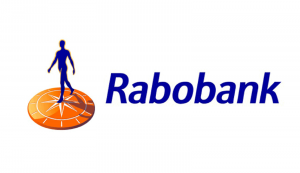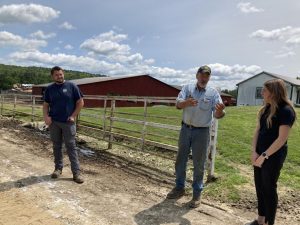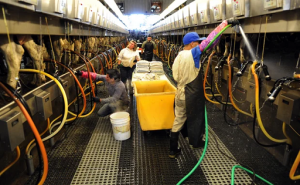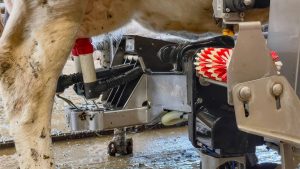
Farmworkers spent October picketing outside Hannaford Supermarket on Shelburne Road in South Burlington, Vermont, calling on the national grocery store chain to join the nonprofit, farmworker-driven Milk with Dignity program to end systemic human rights violations in the northeast dairy industry. The Vermont workers, organized with Migrant Justice, have been calling on Hannaford to join the program since 2019 with little success. The picket is just one of many actions farmworkers have leveraged to urge the company to improve its dairy sourcing practices.
“We’re calling up Hannaford to take action and to take responsibility for the rights of the dairy farm workers in their supply chain,” said Marino Chun, a farmworker and member of the Migrant Justice Farmworker Coordinating Committee, outside a Hannaford market in Shelburne, Vermont. According to Migrant Justice, Hannaford’s store brand of milk is produced in Vermont dairy farms where systemic human rights violations still occur.
Inspired by the Coalition of Immokalee Workers’ Fair Food Program, Migrant Justice launched the Milk with Dignity program in 2017, with Ben & Jerry’s as the first company to commit to the program. To join the program, a company must commit to sourcing from farms that enroll in this worker-driven human rights program, which includes paying a premium to participating farms in exchange for the farm’s commitment to improving conditions to meet a worker-authored code of conduct. “Hannaford hasn’t joined yet, but we aren’t giving up and we’re gonna keep taking action until we get a positive response.”
Migrant Justice also helps to educate workers on their rights in the program, and a third-party auditor—the Milk with Dignity Standards Council (MDSC)—monitors farms’ compliance. Labor conditions for many dairy farm workers are often dangerous and even life-threatening. In 2014, there were 49 reported fatalities in dairy cattle and milk production; one worker was mauled by a two-year-old bull or dairy cow while herding 40-50 other cows into a holding pen, and she was pronounced dead at the scene. In the same year, a survey of nearly 200 Vermont dairy workers revealed the average laborer works 60-80 hours per week, and 40% of farmworkers are paid less than the state minimum wage. Dairy workers also reported having no days off, routinely working seven hours or more without a break to eat, having their pay illegally withheld, not getting eight consecutive hours off per day to sleep, and living in overcrowded housing with inadequate heat.
“I’m here on behalf of a farmworker, a member in our community who is on a farm without the protections of the Milk with Dignity program,” said dairy worker Elizabeth Ramirez. “[That farmworker is] not here speaking to you because he knows that if he speaks out in public, he could be fired from his farm. [He knows] that he doesn’t have the protections against retaliation and his boss could run him off the farm. So we are here for all those who can’t speak out.”
According to a 2021 research study done with Migrant Justice, many Vermont migrant dairy farmworkers receive poor health and safety training and lack sufficient protective gear. Over three-quarters of the workers who responded to the surveys reported being harmed by chemical and biological risks. Almost half of the survey respondents reported headaches, itchy eyes, and cough; a quarter reported breathing difficulties; and three-fourths reported being hurt by animal-related risks.
Organizers at Migrant Justice say these exposures and existing health concerns are avoidable, and migrant workers require advocates and programs such as Milk With Dignity to negotiate for better work-related protection and training, access to health services, and social welfare to ensure their health and safety.
According to the program’s recent report, Milk with Dignity has grown to cover hundreds of farmworkers on dozens of farms in Vermont and New York, covering approximately 20% of Vermont’s dairy industry. Using premium payments from Ben & Jerry’s, farmers have invested over $3.4 million in raises and improvements to workplace and housing conditions.
Now, Migrant Justice is focused on Hannaford. Though Hannaford spokesperson Ericka Dodge told the press that the company expects their suppliers to treat workers fairly, Migrant Justice states that injustices do and will continue to occur without concrete action.
“It’s not fair that workers are living day in and day out suffering [supply chain] abuses while Hannaford closes its eyes to that reality,” said Ramirez. “That’s why we’re here to send a clear message to them to tell them that we are not giving up.”

























